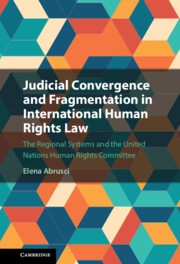 Judicial Convergence and Fragmentation in International Human Rights Law
Judicial Convergence and Fragmentation in International Human Rights Law from Part I - Introducing and Assessing Fragmentation and Convergence in International Human Rights Law
Published online by Cambridge University Press: 22 December 2022
This chapter offers an assessment of judicial fragmentation in international human rights law. The first part of the chapter presents a comparative analysis of the case-law of the three regional systems and the UN Human Rights Committee on rights that are the highly susceptible to trigger fragmentation, either for the relevance of religious, cultural and political concerns or for the vagueness of some terms in the norms’ provisions that could possibly allow very different interpretations. As this analysis shows a substantial convergence or absence of fragmentation, the second part of the chapter focuses on the detailed analysis of the few cases of judicial fragmentation identified, exploring their features in depth. They include case-law on freedom to wear religious attire, indigenous rights and the right to marry for same-sex couples.
To save this book to your Kindle, first ensure [email protected] is added to your Approved Personal Document E-mail List under your Personal Document Settings on the Manage Your Content and Devices page of your Amazon account. Then enter the ‘name’ part of your Kindle email address below. Find out more about saving to your Kindle.
Note you can select to save to either the @free.kindle.com or @kindle.com variations. ‘@free.kindle.com’ emails are free but can only be saved to your device when it is connected to wi-fi. ‘@kindle.com’ emails can be delivered even when you are not connected to wi-fi, but note that service fees apply.
Find out more about the Kindle Personal Document Service.
To save content items to your account, please confirm that you agree to abide by our usage policies. If this is the first time you use this feature, you will be asked to authorise Cambridge Core to connect with your account. Find out more about saving content to Dropbox.
To save content items to your account, please confirm that you agree to abide by our usage policies. If this is the first time you use this feature, you will be asked to authorise Cambridge Core to connect with your account. Find out more about saving content to Google Drive.